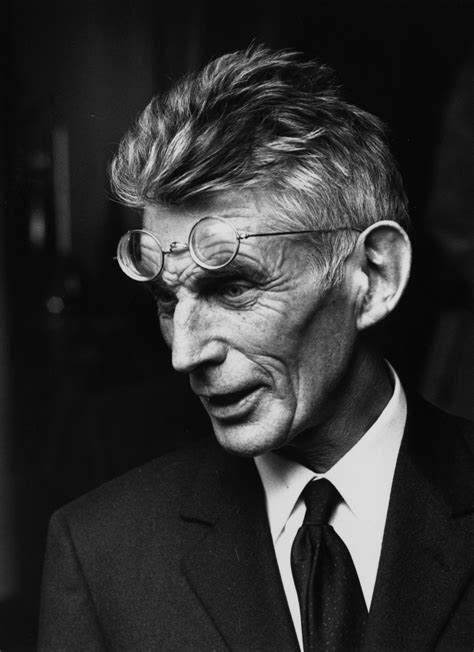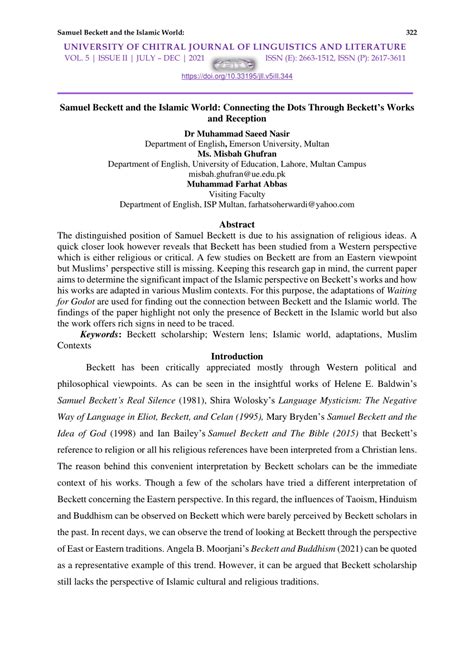In the realm of modern literature, few names shine as brightly as Samuel Beckett. His unique writing style and deep exploration of human existence have left an indelible mark on the world of literature. This article will delve into the life and works of Samuel Beckett, offering a biography of the man behind the words and an overview of his creative genius.
Samuel Beckett was an Irish playwright, novelist, and poet, known for his minimalist style and profound philosophical themes. His unconventional approach to language and narrative challenged traditional literary norms, earning him a reputation as one of the most innovative writers of the 20th century. Through his works, Beckett delved into the depths of human experience, exploring themes of existentialism, despair, and the search for meaning in a seemingly indifferent world.
This article will explore the key moments in Beckett's life that shaped his unique perspective and creative vision. From his early years in Dublin to his time in Paris and beyond, we will uncover the influences that drove Beckett to create some of the most enduring works of modern literature.
Early Life and Education of Samuel Beckett

In this section, we will explore the formative years of Samuel Beckett, delving into his upbringing, early influences, and educational background. We will uncover how these early experiences shaped Beckett's unique perspective and contributed to his development as a creative genius.
| Birthdate: | April 13, 1906 |
| Birthplace: | Dublin, Ireland |
| Family: | Beckett was born into a middle-class Protestant family, with both parents having a strong influence on his intellectual pursuits. |
| Education: | Beckett attended Portora Royal School in Enniskillen, County Fermanagh, where he excelled in academics and developed a deep love for literature. |
Samuel Beckett's Influences and Inspirations
Samuel Beckett's work was shaped by a variety of influences and inspirations that played a crucial role in shaping his creative genius. From literary figures to philosophical ideas, Beckett's works bear the marks of a diverse range of sources that helped mold his unique artistic vision.
Samuel Beckett's Writing Style and Techniques

In this section, we will explore Samuel Beckett's unique writing style and the techniques he employed in his works to create his distinct literary voice.
| 1. Stream of Consciousness | Beckett often used stream of consciousness in his writing, allowing readers to delve into the inner thoughts and emotions of his characters. |
| 2. Minimalism | Beckett's writing is known for its minimalistic style, with sparse dialogue and descriptions that convey profound meaning. |
| 3. Absurdism | Beckett's works often explore the absurdity of the human condition, using dark humor and paradoxes to provoke thought and reflection. |
| 4. Experimental Structure | Beckett experimented with narrative structure, playing with time, space, and form to challenge traditional storytelling conventions. |
Exploring Samuel Beckett's Major Works
In this section, we will delve into some of Samuel Beckett's most iconic works that have solidified his reputation as one of the most influential and innovative playwrights and authors of the 20th century. From his avant-garde plays to his groundbreaking novels, Beckett's works continue to challenge and intrigue readers and audiences alike.
The Impact of Samuel Beckett's Literature

Samuel Beckett's literature has had a profound influence on the world of literature and drama. His unique style and themes have sparked discussions and analysis among scholars and readers, shaping the way we think about human existence, suffering, and the absurdity of life. In this section, we will explore the lasting impact of Beckett's works on the literary world and beyond.
Samuel Beckett's Contribution to Absurdist Theatre
Samuel Beckett is widely recognized as one of the pioneers of absurdist theatre, a genre that emphasizes the meaninglessness and absurdity of the human condition. His plays often feature characters trapped in meaningless and repetitive actions, struggling to find purpose in a seemingly chaotic world. Beckett's unique writing style, filled with dark humor and existential themes, has had a profound influence on modern theatre and continues to inspire artists and audiences around the world.
Samuel Beckett's Evolution as a Playwright

Throughout his career, Samuel Beckett underwent a remarkable transformation as a playwright, constantly pushing the boundaries of traditional dramatic storytelling and form.
Starting from his early works characterized by absurdist themes and minimalistic dialogue, Beckett's writing style evolved over time to incorporate deeper existential questions and experimental techniques.
His later plays, such as "Waiting for Godot" and "Endgame", are considered masterpieces of 20th-century theater, showcasing his unparalleled ability to capture the essence of human existence with profound simplicity and enduring impact.
Samuel Beckett's Exploration of Existential Themes
In his works, Samuel Beckett delves deep into the complexities of human existence, exploring philosophical themes such as identity, meaning, and the absurdity of life. Through his characters and narratives, Beckett provokes thought and reflection on the fundamental questions of human existence, challenging traditional beliefs and concepts.
Beckett's exploration of existential themes pushes the boundaries of conventional storytelling, presenting audiences with a raw and unfiltered view of the human condition. His works often confront the futility of existence, the struggle for connection and communication, and the inevitable limitations of individual experience. Through his unique perspective and poetic prose, Beckett invites readers to confront their own beliefs and assumptions about the nature of existence.
The Reception of Samuel Beckett's Works

Throughout his career, Samuel Beckett's works have been met with a range of reactions from critics, scholars, and audiences alike. From early skepticism to later acclaim, the reception of Beckett's writing has had a significant impact on his legacy as one of the most influential writers of the 20th century.
- Initial Criticism: Beckett's early works, such as "Murphy" and "Watt", were met with confusion and criticism for their unconventional narrative styles and existential themes.
- Transition to Success: Despite the initial challenges, Beckett's later works, including "Waiting for Godot" and "Endgame", gained widespread acclaim for their innovative approaches to theater and literature.
- Legacy and Influence: Over time, Beckett's works have become synonymous with the absurd and the existential, influencing generations of writers and artists across various disciplines.
Samuel Beckett's Awards and Achievements
In this section, we will explore the various awards and achievements that Samuel Beckett received throughout his illustrious career as a writer and playwright. From prestigious literary prizes to critical acclaim, Beckett's work has been recognized and celebrated by audiences and critics alike.
Samuel Beckett's Legacy in Literature and Theatre

Samuel Beckett's impact on the worlds of literature and theatre is profound and enduring. His innovative approach to storytelling and his exploration of the human condition have left a lasting mark on the arts that continues to inspire and challenge creators to this day.
Samuel Beckett: A 20th Century Literary Icon
Discover the profound impact Samuel Beckett had on 20th century literature and his enduring legacy as a literary icon. Explore his innovative writing style, existential themes, and contributions to the absurdism movement that continue to influence writers and readers around the world.
FAQ
What are some notable works by Samuel Beckett?
Some of Samuel Beckett's most famous works include "Waiting for Godot," "Endgame," "Krapp's Last Tape," and "Happy Days." These plays are considered classics of twentieth-century literature and have had a profound influence on modern drama.
How did Samuel Beckett's experiences during World War II influence his writing?
During World War II, Samuel Beckett worked with the French Resistance and was forced to flee Paris to escape the Gestapo. These experiences of fear, uncertainty, and despair influenced his writing, leading to the themes of existentialism and the absurd that are present in many of his works.
What was Samuel Beckett's writing style like?
Samuel Beckett's writing style is characterized by its spare, minimalist language, dark humor, and exploration of the human condition. He often used repetitive phrases, fragmented dialogue, and bleak settings to convey themes of hopelessness, isolation, and the futility of existence.
How did Samuel Beckett's work challenge traditional ideas of storytelling and theater?
Samuel Beckett's work challenged traditional ideas of storytelling and theater by breaking conventions of plot, character development, and language. His plays often feature repetitive actions, non-linear narratives, and enigmatic dialogue, forcing audiences to confront their own assumptions about meaning and communication.



